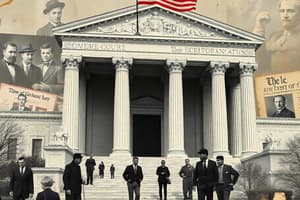Podcast
Questions and Answers
Which case established the principle that the Bill of Rights applies only to the federal government and not to state governments?
Which case established the principle that the Bill of Rights applies only to the federal government and not to state governments?
- Plessy v. Ferguson
- Dred Scott v. Sandford
- Barron v. Baltimore (correct)
- Schenck v. United States
Which case declared that African-Americans are not citizens of the United States and that slavery is protected by the Constitution?
Which case declared that African-Americans are not citizens of the United States and that slavery is protected by the Constitution?
- Schenck v. United States
- Dred Scott v. Sandford (correct)
- Barron v. Baltimore
- Plessy v. Ferguson
Which case established the 'separate but equal' doctrine, stating that segregation is valid as long as separate facilities are equal?
Which case established the 'separate but equal' doctrine, stating that segregation is valid as long as separate facilities are equal?
- Barron v. Baltimore
- Dred Scott v. Sandford
- Schenck v. United States
- Plessy v. Ferguson (correct)
Which case declared that freedom of speech, as described in the 1st Amendment, applies to the states through the 14th Amendment’s Due Process Clause?
Which case declared that freedom of speech, as described in the 1st Amendment, applies to the states through the 14th Amendment’s Due Process Clause?
Which case declared that segregation in public schools violates the 14th Amendment’s guarantee of equal protection of the laws?
Which case declared that segregation in public schools violates the 14th Amendment’s guarantee of equal protection of the laws?
Match the following court cases with their initial rulings:
Match the following court cases with their initial rulings:
Match the following court cases with their related constitutional amendments:
Match the following court cases with their related constitutional amendments:
Match the following court cases with their impacts on American society:
Match the following court cases with their impacts on American society:
Match the following court cases with their key topics:
Match the following court cases with their key topics:
Match the following court cases with their subsequent overrules:
Match the following court cases with their subsequent overrules:




